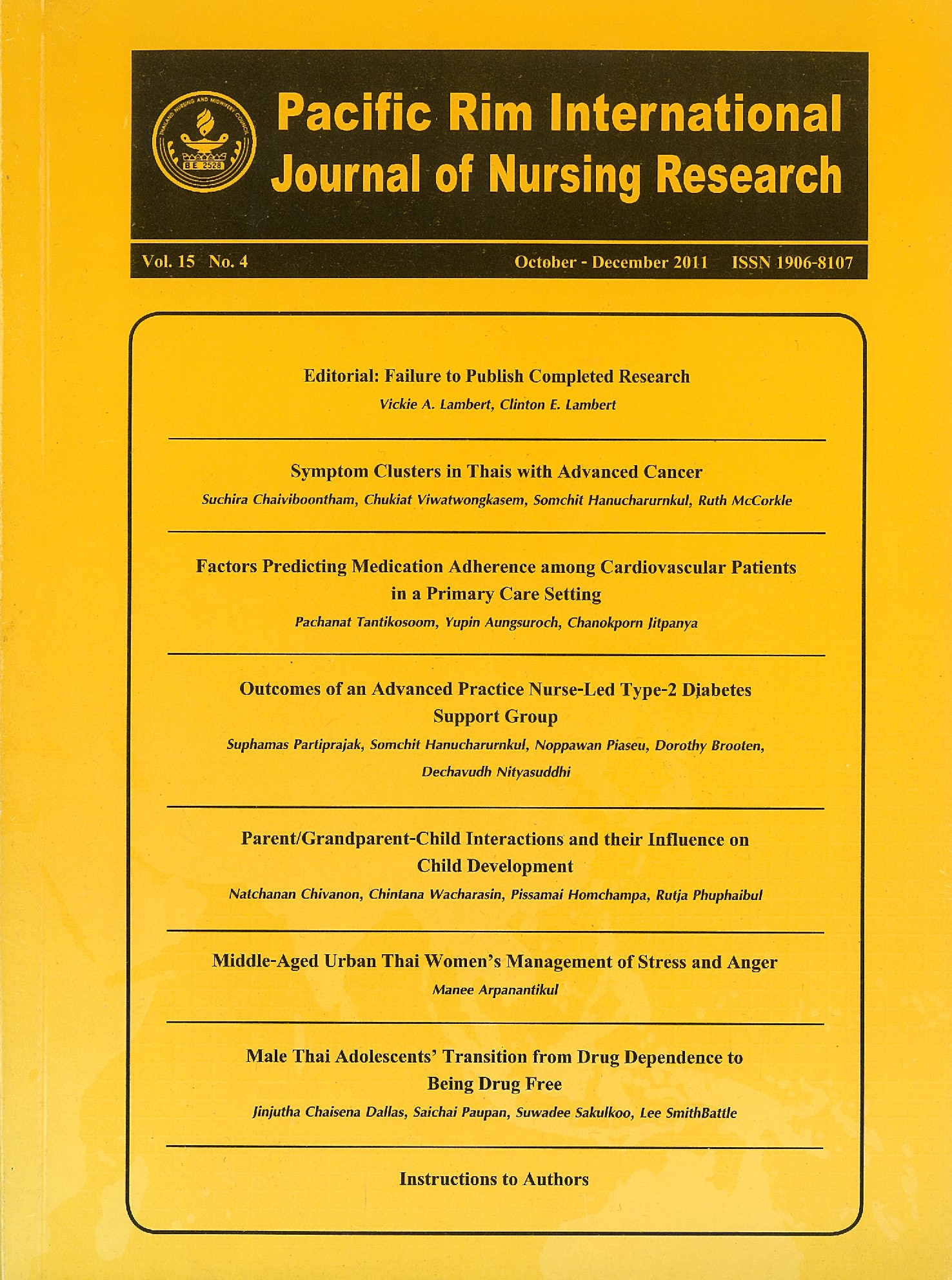Factors Predicting Medication Adherence among Cardiovascular Patients in a Primary Care Setting
Keywords:
พฤติกรรมการรับประทานยา, ผู้ป่วยโรคหลอดเลือดหัวใจ, ระดับปฐมภูมิ, medication adherence, cardiovascular patients, primary care settingAbstract
บทคัดย่อ
พฤติกรรมการรับประทานยาในผู้ป่วยโรคหัวใจและหลอดเลือดถือว่าเป็นพฤติกรรม ส่วนบุคคลที่สำคัญอันส่งผลต่อการบริหารจัดการต่อโรค ลดอัตราการตาย และความสำเร็จในการดูแลสุขภาพ อย่างไรก็ตาม ประเทศไทยยังมีการศึกษาเพียงเล็กน้อย ดังนั้น วัตถุประสงค์การศึกษาวิจัย ก) เพื่อหา ความสัมพันธ์ของปัจจัยส่วนบุคคล (อายุ เพศ สถานภาพ และระดับการศึกษา) จำนวนโรคความเจ็บป่วยอื่นนอกหนือจากโรคหัวใจและหลอดเลือด จำนวนยาที่รับประทานในแต่ละวันและพฤติกรรมการรับประทานยา ข) เพื่อศึกษาปัจจัยทำนายของปัจจัยส่วนบุคคล (อายุ เพศ สถานภาพ และระดับการศึกษา) จำนวนโรคความเจ็บป่วยอื่นนอกหนือจากโรคหัวใจและหลอดเลือด จำนวนยาที่รับประทานในแต่ละวันและพฤติกรรมการรับประทานยา การศึกษานี้เป็นวิจัยแบบตัดขวาง (Cross Sectional Design) โดยกลุ่มตัวอย่างคือ ผู้ป่วยโรคหัวใจและหลอดเลือด จำนวน 160 คนที่ได้จากการสุ่มอย่างง่ายจากกลุ่มที่มี คุณสมบัติตามที่กำหนดในโรงพยาบาลระดับปฐมภูมิของ ประเทศไทย เครื่องมือที่ใช้คือ แบบสอบถามข้อมูลทั่วไปซึ่งพัฒนาโดยผู้วิจัย และแบบประเมิน MMAS ฉบับภาษาไทย ข้อมูลที่ได้นำมาวิเคราะห์ทางสถิติ ประกอบด้วยการวิเคราะห์ข้อมูลเชิงบรรยาย การหาความสัมพันธ์โดยเพียร์สัน (Pearson’s) แกรมม่า (Gamma’s) ฟี เคมเมอร์วี (Phi-Cramer’s V) และวิเคราะห์การถดถอยหลายลำดับชั้น (Hierarchical multiple regression)
ผลการศึกษาพบความสัมพันธ์เชิงผกผันอย่างมีนัยสำคัญทางสถิติระหว่าง จำนวนโรคความเจ็บป่วยอื่นนอกเหนือจากโรคหัวใจและหลอดเลือด กับพฤติกรรมการรับประทานยา ผลการวิเคราะห์ความสัมพันธ์การถดถอยหลายลำดับชั้น พบว่า จำนวนโรคความเจ็บป่วยอื่นนอกเหนือจากโรคหัวใจและหลอดเลือด การศึกษาในระดับมัธยมและ เพศชาย สามารถร่วมกันทำนายพฤติกรรมการรับประทานยาได้ ร้อยละ 16.3 ซึ่งผลการศึกษาสามารถนำไปใช้เป็นข้อมูลการส่งเสริมพฤติกรรมการรับประทานยาในผู้ป่วยโรคหัวใจและหลอดเลือดที่ได้รับการดูแลในระดับปฐมภูมิต่อไป
คำสำคัญ : พฤติกรรมการรับประทานยา, ผู้ป่วยโรคหลอดเลือดหัวใจ, ระดับปฐมภูมิ
Abstract
Adherence to prescribed medications, among individuals with cardiovascular disease, has long been considered important in terms of disease management, mortality reduction and achievement of optimal health. However, in Thailand, minimal research in this area of concern has been undertaken. Thus, the purposes of this study, using a cross-sectional research design, were to examine in Thais with cardiovascular disease: a) the correlations among select psychosocial demographic characteristics (i.e. age, gender, marital status and education), presence of co-morbidities, medications taken daily and medication adherence; and, b) the best predictors (psychosocial demographic characteristics [i.e. age, gender, marital status and education], presence of co-morbidities, and medication taken daily) of medication adherence.
Subjects included 160 randomly selected patients, with cardiovascular disease, from one primary care setting in Thailand. Study instruments included a researcher-developed psychosocial demographic characteristics questionnaire and the Thai version of the Morisky Medication Adherence Scale. Data were evaluated using descriptive statistics, Pearson’s, Gamma and Phi-Cramer’s V correlations, and hierarchical multiple regression
The results revealed a significant negative correlation between the presence of co-morbidities and medication adherence. No other significant correlations were found among the variables. Hierarchical multiple regression analysis revealed the presence of co-morbidities, secondary education and male gender together explained 16.3 % of the variance in predicting medication adherence. The findings may prove helpful in the development of intervention guidelines regarding medication adherence for patients who have cardiovascular disease and are being cared for in a primary care setting.
Keywords : medication adherence, cardiovascular patients, primary care setting
Downloads
How to Cite
Issue
Section
License
Copyright: The Pacific Rim International Journal of Nursing Research, Thailand Nursing & Midwifery Council has exclusive rights to publish, reproduce and distribute the manuscript and all contents therein.







.png)


